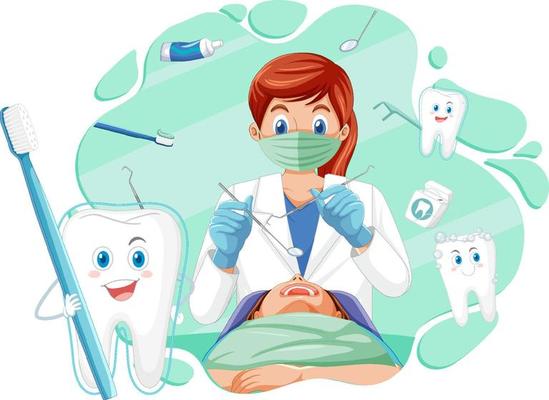Find Out About Regular Oral Issues Your Dentist Can Deal With
Understanding constant oral concerns is essential for preserving ideal dental health and wellness. Issues such as tooth cavities, gum tissue condition, tooth sensitivity, foul-smelling breath, and tooth decay prevail yet usually ignored until they become serious. Dental professionals have the proficiency to diagnose and treat these problems, therefore protecting against additional complications. Regular dental sees and personalized care strategies can resolve these troubles successfully, making sure a healthier and brighter smile. But what certain treatments do dentists use to combat these concerns, and exactly how can early treatment make a difference? The response to these concerns provide beneficial insights into protecting your dental health and wellness.
Dental Caries
Cavities, also referred to as tooth decays, are a prevalent oral health issue caused by the demineralization of tooth enamel because of acid production from microbial plaque. This process begins when germs in the mouth metabolize sugars and starches from food, creating acids that deteriorate the enamel. If not addressed promptly, this disintegration can permeate much deeper right into the tooth, impacting the dentin and eventually the pulp, possibly leading to extreme discomfort and infection.
The beginning of cavity development typically existing as white places on the tooth surface, showing initial demineralization. As the procedure advances, these spots can turn into black or brownish sores, representing more comprehensive decay. Normal oral exams are important for very early discovery, as cavities in their inceptive stages can be treated with remineralization methods, such as fluoride therapies.
As soon as a cavity has developed, corrective intervention is essential. Dental experts typically remove the decayed section of the tooth and fill the dental caries with products such as composite material, amalgam, or ceramic. In more severe situations, a crown or origin canal treatment may be needed. Safety nets, including great dental health techniques and dietary adjustments, play a pivotal function in minimizing the threat of cavities.
Periodontal Disease
While tooth cavities represent a significant issue for oral health, one more important problem that demands focus is gum condition. Known as gum condition, gum tissue condition is an inflammatory problem influencing the tissues bordering and sustaining the teeth. It is mostly triggered by the accumulation of plaque-- a sticky movie of germs that creates on teeth.
Gum tissue condition proceeds via stages, starting with gingivitis, defined by redness, swelling, and hemorrhaging gum tissues (dentist eugene or). If left unattended, gingivitis can intensify to periodontitis, where the inner layer of the gum tissue and bone draw away from the teeth, creating pockets that come to be contaminated. With time, the toxic substances produced by the germs break down the bone and connective cells that hold teeth in position, possibly resulting in missing teeth
Early discovery and treatment are critical. Expert oral cleanings and enhanced dental hygiene practices, such as cleaning two times daily and flossing, can take care of gingivitis. For advanced stages, treatments might include scaling and root planing, anti-biotics, or perhaps medical interventions.
Routine oral examinations play a critical function in taking care of and avoiding gum tissue condition. Dental experts can identify early indications and advise appropriate interventions, making sure the upkeep of healthy and balanced gums and general dental wellness.
Tooth Level Of Sensitivity
Tooth sensitivity influences millions of individuals worldwide, providing an usual yet often distressing oral issue. This condition occurs when the enamel, the outer safety layer of the teeth, is jeopardized, disclosing the underlying dentin.
Numerous variables add to enamel disintegration and subsequent tooth sensitivity, including aggressive cleaning, acidic foods and drinks, periodontal economic downturn, and bruxism (teeth grinding) Furthermore, dental procedures such as teeth bleaching can briefly enhance sensitivity.
Foul Breath
Another prevalent dental worry that influences people' day-to-day lives is poor breath, clinically labelled bad breath. Bad breath often originates from bad oral hygiene, which allows food particles to remain in the mouth, promoting bacterial growth.

Dentists play a critical function in dealing with and diagnosing halitosis. They can recognize the source through a detailed evaluation and give tailored guidance and treatment strategies. Recommendations may include improving dental health practices, such as regular brushing and flossing, utilizing anti-bacterial mouthwashes, remaining moisturized, and attending to any kind of dental problems. In some instances, a referral to an expert may be needed to deal with underlying illness adding to bad breath. Effective administration of bad breath not just boosts dental wellness yet also significantly improves lifestyle.
Tooth Decay

Preventing tooth decay includes a mix of good oral health techniques and normal oral exams. Cleaning teeth a minimum of twice daily with fluoride toothpaste, flossing to remove plaque between teeth, and limiting the consumption of sugary foods and drinks are vital preventative actions. Fluoride therapies, oral sealants, and professional cleanings offered by a dentist can also play a significant function in fortifying enamel and stopping degeneration.
Dental practitioners can get rid of decayed tissue and recover the tooth with fillings made from products such as composite material, amalgam, or porcelain. By attending to tooth decay promptly, dental practitioners assist maintain oral structure and feature, making sure long-term dental health.
Verdict
Attending to common oral worries such as cavities, periodontal disease, tooth level of sensitivity, foul-smelling breath, and tooth decay is crucial for keeping ideal oral health and wellness and overall wellness. Dental professionals have the knowledge to diagnose and treat these concerns efficiently, making certain tailored look after each individual. Normal dental exams and preventive procedures are crucial in determining and taking care of these worries early, promoting a much healthier and extra confident smile over a lifetime.
:max_bytes(150000):strip_icc():focal(749x0:751x2)/Dentist-122823-2-279b2c59bcd240a28a5a118cdd4176ba.jpg)
Tooth decay, additionally recognized as dental cavities, takes place when the enamel, the outer look at here now layer of the tooth, is eroded by acids created by germs in the mouth. Cleaning teeth at least two times daily with fluoride toothpaste, flossing to get rid of plaque in between teeth, and limiting the consumption of sugary foods and beverages are crucial preventive steps.Resolving common oral problems such as tooth cavities, periodontal disease, tooth sensitivity, bad breath, and tooth decay is important for preserving optimum dental health and wellness and general health.